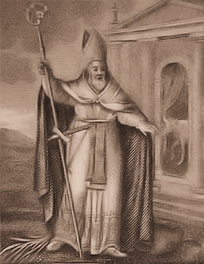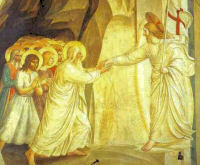Ordinary Time: November 29th
Friday of the Thirty-Fourth Week in Ordinary Time
Other Commemorations: St. Saturninus, Martyr (RM)
» Enjoy our Liturgical Seasons series of e-books!
The Roman Martyrology commemorates St. Saturinius (d. 304), a Roman priest and martyr. With his deacon Saint Sisinius, he was sentenced to hard labor, exiled, tortured and beheaded for his faith in the persecutions of Emperor Decius.
St. Saturninus
 Saturninus went from Rome, by direction of Pope Fabian, about the year 245, to preach the faith in Gaul. He fixed his episcopal see at Toulouse, and thus became the first Christian bishop of that city. There were but few Christians in the place. However, their number grew fast after the coming of the Saint; and his power was felt by the spirits of evil, who received the worship of the heathen. His power was felt the more because he had to pass daily through the capitol, the high place of the heathen worship, on the way to his own church. One day a great multitude was gathered by an altar, where a bull stood ready for the sacrifice. A man in the crowd pointed out Saturninus, who was passing by, and the people would have forced him to idolatry; but the holy bishop answered: "I know but one God, and to Him I will offer the sacrifice of praise. How can I fear gods who, as you say, are afraid of me?" On this he was fastened to the bull, which was driven down the capitol. The brains of the Saint were scattered on the steps. His mangled body was taken up and buried by two devout women.
Saturninus went from Rome, by direction of Pope Fabian, about the year 245, to preach the faith in Gaul. He fixed his episcopal see at Toulouse, and thus became the first Christian bishop of that city. There were but few Christians in the place. However, their number grew fast after the coming of the Saint; and his power was felt by the spirits of evil, who received the worship of the heathen. His power was felt the more because he had to pass daily through the capitol, the high place of the heathen worship, on the way to his own church. One day a great multitude was gathered by an altar, where a bull stood ready for the sacrifice. A man in the crowd pointed out Saturninus, who was passing by, and the people would have forced him to idolatry; but the holy bishop answered: "I know but one God, and to Him I will offer the sacrifice of praise. How can I fear gods who, as you say, are afraid of me?" On this he was fastened to the bull, which was driven down the capitol. The brains of the Saint were scattered on the steps. His mangled body was taken up and buried by two devout women.
—Excerpted from Butler's Lives of the Saints
Symbols and Representation: Bishop dragged by a bull; bishop with a bull at his feet
Highlights and Things to Do:
- San Saturnino Martire is the church in Rome marking the place were St. Saturninus was martyred.
- Some of St. Saturnius' relics are found in the minor basilica of St. John and St. Paul (Santi Giovanni e Paolo) in Rome, the rest are now housed in San Saturnino Martire.
On November 29, 1987, the relics of the holy Roman martyr Saturninus, which remained for a long time in the Basilica of Saints John and Paul, were transferred to the parish church dedicated to his name and erected by the Supreme Pontiff Pius XI, in 1930, for the pastoral care. - Read more about his relics and see more images.






